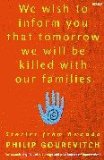Summary | Excerpt | Reviews | Readalikes | Genres & Themes | Author Bio
Stories From Rwanda

Critics' Opinion:
Readers' Opinion:
First Published:
Sep 1998, 356 pages
Paperback:
Mar 2000, 368 pages
Considering the enormity of the task, it is tempting to play with theories of collective madness, mob mania, a fever of hatred erupted into a mass crime of passion, and to imagine the blind orgy of the mob, with each member killing one or two people. But at Nyarubuye, and at thousands of other sites in this tiny country, on the same days of a few months in 1994, hundreds of thousands of Hutus had worked as killers in regular shifts. There was always the next victim, and the next. What sustained them, beyond the frenzy of the first attack, through the plain physical exhaustion and mess of it?
The pygmy in Gikongoro said that humanity is part of nature and that we must go against nature to get along and have peace. But mass violence, too, must be organized; it does not occur aimlessly. Even mobs and riots have a design, and great and sustained destruction requires great ambition. It must be conceived as the means toward achieving a new order, and although the idea behind that new order may be criminal and objectively very stupid, it must also be compellingly simple and at the same time absolute. The ideology of genocide is all of those things, and in Rwanda it went by the bald name of Hutu Power. For those who set about systematically exterminating an entire people--even a fairly small and unresisting subpopulation of perhaps a million and a quarter men, women, and children, like the Tutsis in Rwanda--blood lust surely helps. But the engineers and perpetrators of a slaughter like the one just inside the door where I stood need not enjoy killing, and they may even find it unpleasant. What is required above all is that they want their victims dead. They have to want it so badly that they consider it a necessity.
So I still had much to imagine as I entered the classroom and stepped carefully between the remains. These dead and their killers had been neighbors, schoolmates, colleagues, sometimes friends, even in-laws. The dead had seen their killers training as militias in the weeks before the end, and it was well known that they were training to kill Tutsis; it was announced on the radio, it was in the newspapers, people spoke of it openly. The week before the massacre at Nyarubuye, the killing began in Rwanda's capital, Kigali. Hutus who opposed the Hutu Power ideology were publicly denounced as "accomplices" of the Tutsis and were among the first to be killed as the extermination got under way. In Nyarubuye, when Tutsis asked the Hutu Power mayor how they might be spared, he suggested that they seek sanctuary at the church. They did, and a few days later the mayor came to kill them. He came at the head of a pack of soldiers, policemen, militiamen, and villagers; he gave out arms and orders to complete the job well. No more was required of the mayor, but he also was said to have killed a few Tutsis himself.
The killers killed all day at Nyarubuye. At night they cut the Achilles tendons of survivors and went off to feast behind the church, roasting cattle looted from their victims in big fires, and drinking beer. (Bottled beer, banana beer--Rwandans may not drink more beer than other Africans, but they drink prodigious quantities of it around the clock.) And, in the morning, still drunk after whatever sleep they could find beneath the cries of their prey, the killers at Nyarubuye went back and killed again. Day after day, minute to minute, Tutsi by Tutsi: all across Rwanda, they worked like that. "It was a process," Sergeant Francis said. I can see that it happened, I can be told how, and after nearly three years of looking around Rwanda and listening to Rwandans, I can tell you how, and I will. But the horror of it--the idiocy, the waste, the sheer wrongness--remains uncircumscribable.
Like Leontius, the young Athenian in Plato, I presume that you are reading this because you desire a closer look, and that you, too, are properly disturbed by your curiosity. Perhaps, in examining this extremity with me, you hope for some understanding, some insight, some flicker of self-knowledge--a moral, or a lesson, or a due about how to behave in this world: some such information. I don't discount the possibility, but when it comes to genocide, you already know right from wrong. The best reason I have come up with for looking closely into Rwanda's stories is that ignoring them makes me even more uncomfortable about existence and my place in it. The horror, as horror, interests me only insofar as a precise memory of the offense is necessary to understand its legacy.
(c) 1998 Philip Gourevitch All rights reserved.





The Flower Sisters
by Michelle Collins Anderson
From the new Fannie Flagg of the Ozarks, a richly-woven story of family, forgiveness, and reinvention.

The House on Biscayne Bay
by Chanel Cleeton
As death stalks a gothic mansion in Miami, the lives of two women intertwine as the past and present collide.

The Funeral Cryer by Wenyan Lu
Debut novelist Wenyan Lu brings us this witty yet profound story about one woman's midlife reawakening in contemporary rural China.
Your guide toexceptional books
BookBrowse seeks out and recommends the best in contemporary fiction and nonfiction—books that not only engage and entertain but also deepen our understanding of ourselves and the world around us.